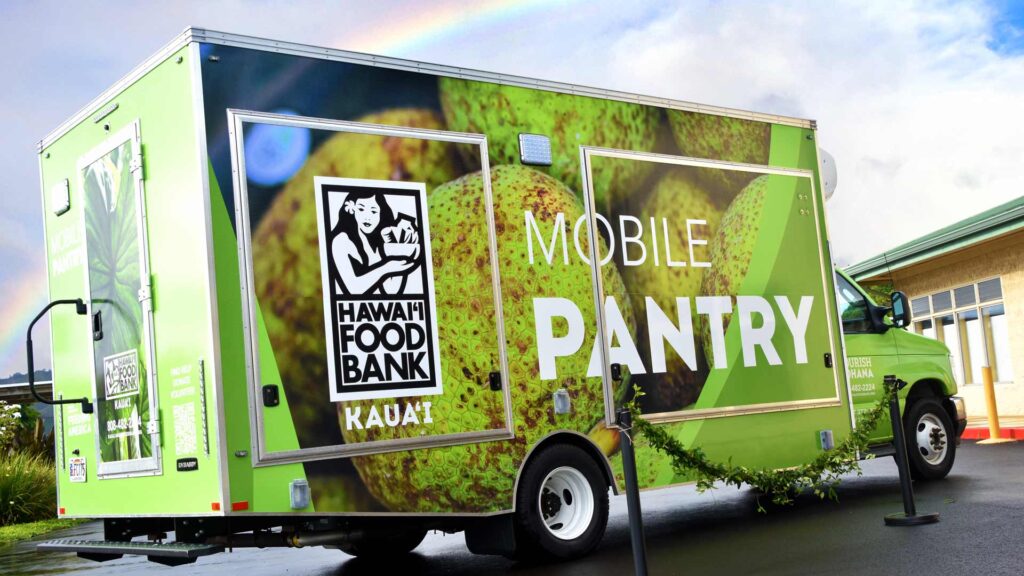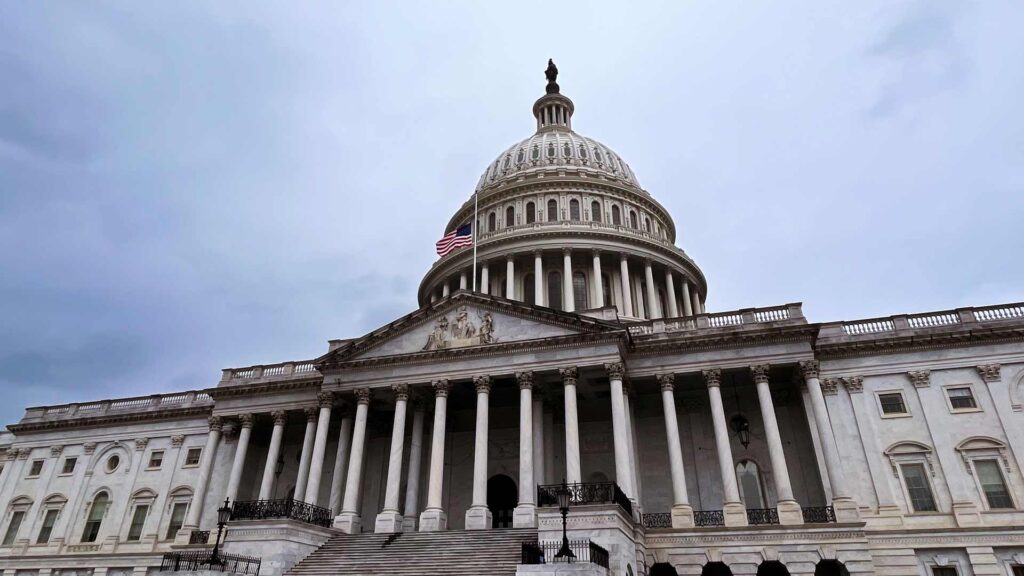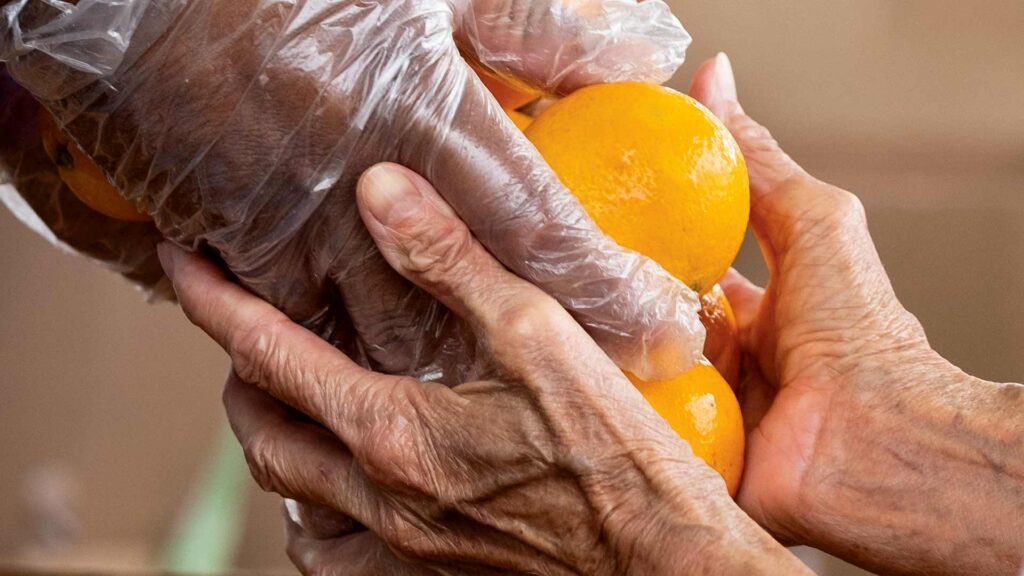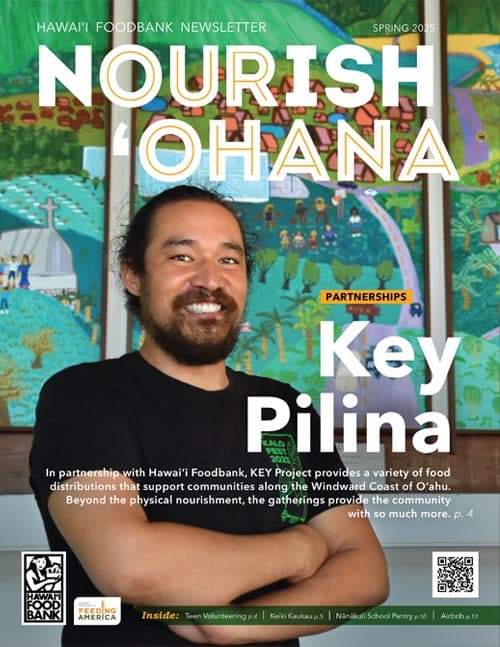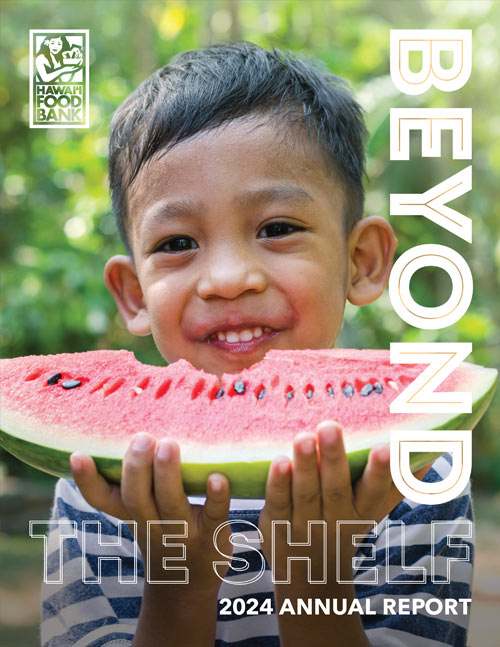Operating with Compassion
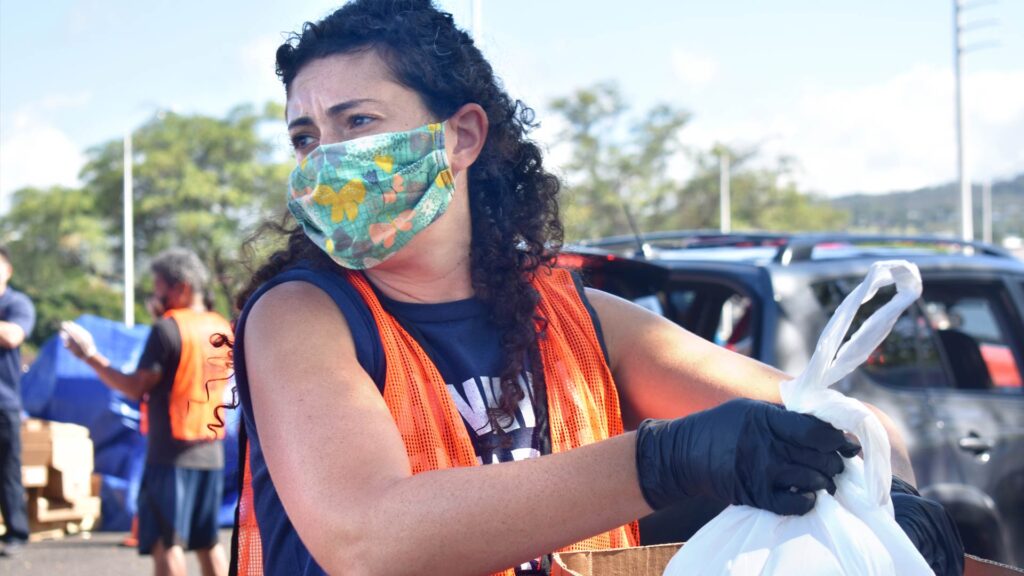
Danny Schlag
How the pandemic set the stage for opera director Omer Ben Seadia to connect with her community
I wondered what it felt like to be in that line and to see your neighbors in that line with you.
— Omer Ben Seadia, travelling opera director
When it comes to the world of art, perhaps no greater art form exists than opera. It is considered by many to be the most complete expression — combining all of the elements of art, literature, music, drama and dance. Naturally, this collective coming together of so many people and mediums lends itself to the strongest and purest of human emotions. Instances of pain and joy, frustration and elation, and so many more arise in their most unadulterated forms. Accordingly, in any given operatic performance, there is bound to be something that every member of the audience can identify with.
“Opera is for everyone, and every opera is an invitation. An invitation for interpretation,” says travelling opera director Omer Ben Seadia. “It’s this powerful art form where you can live larger than life, where everything has a huge expression, where you have so many different art forms coming together. Everyone is working together towards this incredible, powerful thing.”
Known for her inventive, thoughtful and socially conscious productions, Omer has been establishing herself as one of the fresh new voices in opera. It’s been a lifetime commitment for the Israeli director from Tel Aviv. With both parents working in the industry, Omer grew up in the theater and fell in love with opera when she performed in her first production at the age of 15. She would go on to spend more than a decade with the Israeli Opera before beginning her international directing career in the United States — eventually bringing her to Hawai‘i.
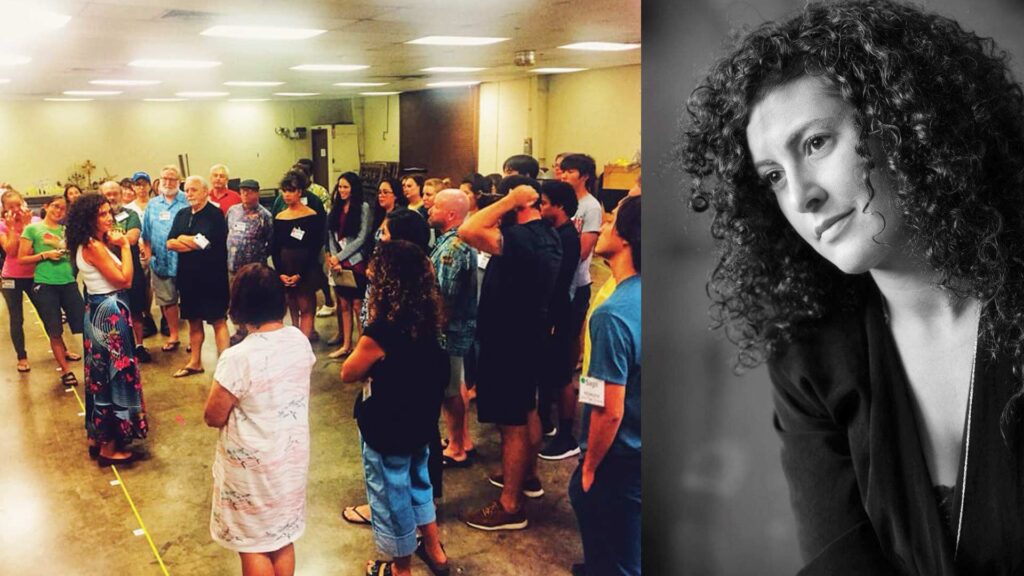
“There’s so much homegrown talent. There have been amazing opera singers to come out of Hawai‘i,” says Omer. “It’s been amazing not only to see people’s talent but also how everyone always shows up so joyfully. I’ve never worked with people so happy to come together to perform and eat and drink and just be joyful together. It’s really, really spectacular.”
She fell in love with the people and decided to move to Hawai‘i permanently. Now residing in the North Shore plantation town of Waialua, Omer began spending her time between home and directing at opera companies all over North America. She welcomed this fast-paced lifestyle, but it was all about to change.
“Then the pandemic hit, and it was sort of a massive blow to my industry. Like a lot of industries, we all got grounded,” explains Omer. “I remember, for the first time in my professional career, looking at my schedule and thinking, ‘I don’t know when the next production is going to happen.’ And that was terrifying for many reasons.”
The COVID-19 pandemic has had a devasting impact on the cultural and creative industry.
Performing arts like opera have been hit especially hard in the crisis due to the nature of the craft, which requires the physical presence of an audience. The restrictions during the pandemic meant performance activities were no longer permissible, and people like Omer suddenly found themselves without their outlet — cut off from the human connection that their artistic livelihoods thrive upon.
“The only option we had at our disposal was to stay put. That was the safest thing for everyone to do. But, like a lot of people, I was feeling very helpless — feeling like the world was caving in around us, and I was just sitting at home,” Omer remembers. “For someone like me who is used to being so active, I really wanted to find something that could immediately help. Something that could have an impact right away. And that’s when Hawai‘i Foodbank came into my life.”
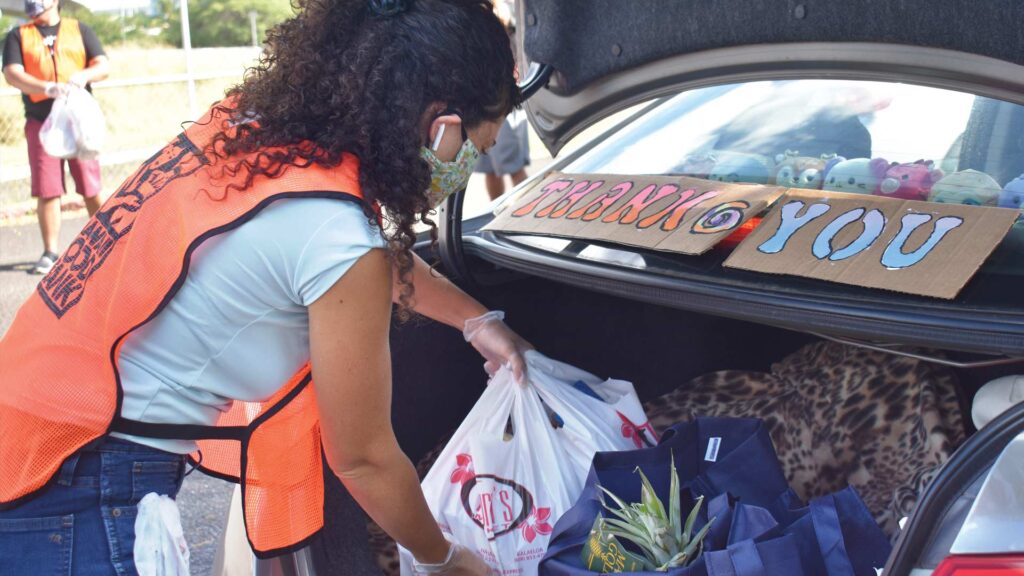
Even though you’re separated, there’s something about knowing you’re not alone in this.
— Omer Ben Seadia, Hawai‘i Foodbank volunteer
Omer began searching for ways to roll up her sleeves, contribute in a meaningful way and connect with her community. She heard Hawai‘i Foodbank was still functioning as an essential service, and she got started right away by volunteering in the warehouse. She spent her early shifts sorting produce and dry goods with other volunteers and staff members who helped her learn the ropes quickly — not only in regards to the physical labor but also in terms of absorbing the mission.
“The Foodbank taught me that hunger can impact anyone. I think when I was coming into it, I sort of had this image like a lot of people have of what hunger looks like and what food need looks like. I think if Hawai‘i Foodbank has taught me anything, and if the pandemic has taught me anything, it is that food insecurity looks like a lot of different things — and it will surprise you.”
This realization took on an even more dramatic look in the upcoming weeks. In order to meet the growing need, Hawai‘i Foodbank began deploying a series of large-scale Pop-Up Food Distributions across O‘ahu in order to provide emergency food, fresh produce and other items to vulnerable households who lost access to food during the pandemic. The first distribution was set to take place at Waipi‘o Soccer Complex, and Omer did not hesitate to sign up. She was among the first on the front lines to distribute food.
“I was truly astonished by the amount of people that showed up that day. When we saw the sea of thousands of cars lined up, I think it really blew everyone away in terms of what the actual need is. We were astonished. Talk about a reality check.”
Four thousand households received food that day, and Omer interacted with nearly every one of them.
And, just as every opera is an invitation for interpretation, every interaction Omer and her fellow volunteers encountered that day offered a new perspective — and new connections.
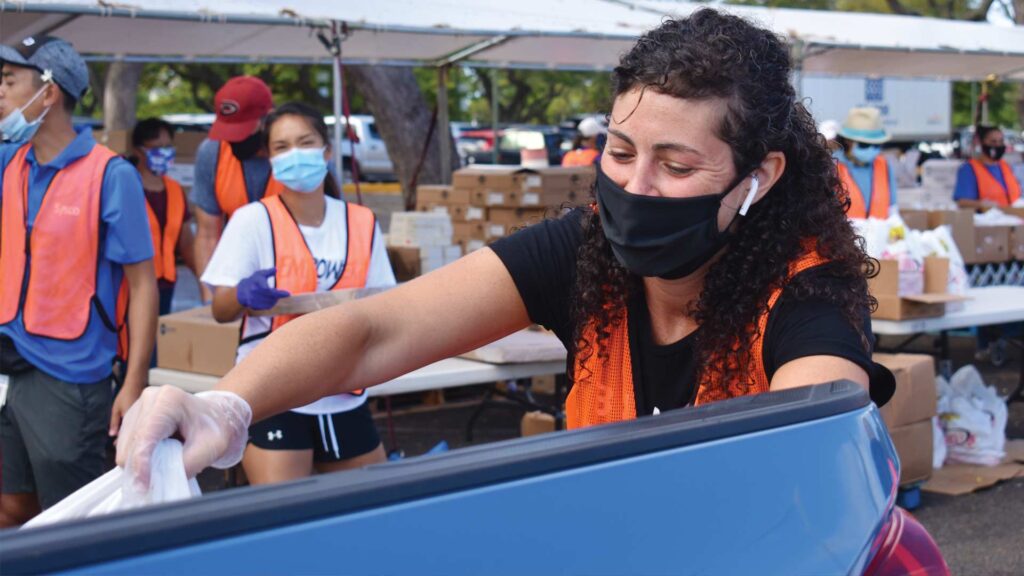
“It was a teachable day. Everyone walked away knowing more. I wondered what it felt like to be in that line and to see your neighbors in that line with you,” reflects Omer. “I know there was some frustration and shame and fear, but I also think there was a sense of comfort. Even though you’re separated, there’s something about knowing you’re not alone in this.”
She holds onto this sense of connection and, even with her work productions slowly getting back underway, continues to find opportunities to volunteer with Hawai‘i Foodbank. In just one year, Omer has worked 60 volunteer shifts, providing more than 300 hours of volunteer service — and she encourages others to give it a try, too.
“I just want people to know that volunteering is for everyone, and the Foodbank does such a great job. I’ve had the fortune to volunteer in all these different avenues, which has made me feel like there is a way for everyone to volunteer that works for them.”
For Omer, each volunteer experience during the pandemic has shed a new, yet familiar, light on the world around her. Like the operas she’s directed, it’s created this collective human event that enables everyone to relate to one another and have more empathy.
It's so easy to relate to. Hawai‘i Foodbank is for everyone.
— Omer Ben Seadia, Hawai‘i Foodbank volunteer
“I think that’s at the heart of what the Foodbank does. It answers this very visceral need in the community. Especially now. No matter where you come from or what your financial situation was or what your employment situation is — the pandemic sort of leveled the playing field, and it hit everybody. The Foodbank is one of those organizations that is rare in that everyone knows what the mission is and how much it does. It’s something we can all get behind — regardless of party or politics or where you stand on any issue. It’s so easy to relate to,” says Omer with a smile. “Hawai‘i Foodbank is for everyone.”
Just as an opera can make us hear, feel and see the world differently — Omer stands tall as an example of the good that can come out of this pandemic. It offers us a reflection of who we are, how we connect to one another and what it means to be human.

